After a false start, Impossible Metals gets back into the starting blocks for its marathon push towards deep sea mining.
It's the second attempt by Impossible Metals to get its deep sea mining plan off the ground, but can it overcome public sentiment in American Samoa?
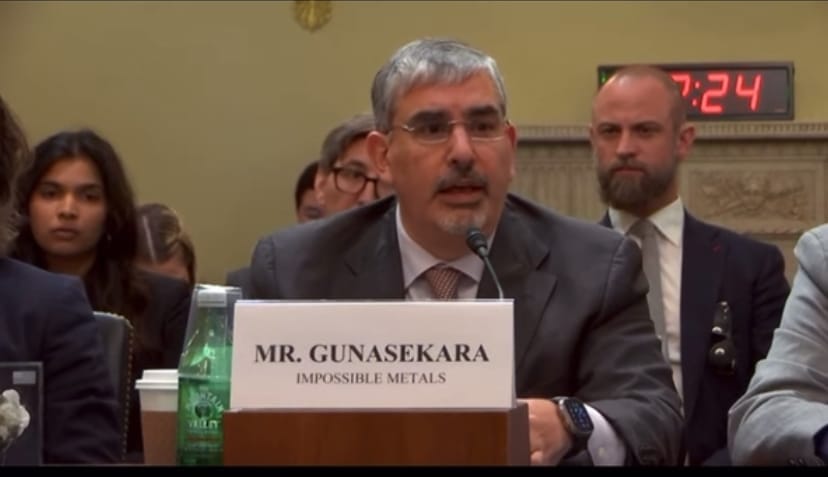
This week, another American company took a step forward in the journey towards deep sea mining.
Impossible Metals, a California start-up founded by a Silicon Valley alum, got the nod from the US Department of Interior to start the evaluation process for a seabed minerals lease.
If granted, the lease would permit the company to explore the economic potential of the seabed minerals off the coast of American Samoa.
American Samoa
As the name suggests, American Samoa is US territory. The islands, located in the South Pacific between Hawaii and New Zealand, are thousands of kilometres away from the US mainland, but because they were ceded in a succession of treaties in the early 1900s, the waters around them fall under US jurisdiction.
That gives the US Bureau of Ocean Energy Management, BOEM, the authority to regulate and it deploys staff at a Pacific Regional Office to execute day-to-day oversight.
What happens next
BOEM says it will now conduct "a multi-step evaluation process grounded in science, public engagement and environmental stewardship".
The agency plans to request public feedback through the US Federal Register, as a first step:
"This notice will seek input from the Indigenous Island community, ocean users, industry stakeholders, government agencies and the public. Feedback will help inform BOEM’s assessment of geologic conditions, potential environmental and cultural impacts and the multiple uses of the area, such as navigation and fishing."
In its own press release about the application development, Impossible Metals said it welcomes the opportunity to engage with the stakeholders:
"The company plans to work closely with the local community in American Samoa and other agencies, scientists, and environmental organizations to ensure responsible development and long-term environmental protection".
American Samoa ban
But the last set of consultations didn't go so well for Impossible Metals.
This is not the first time the company has started this process. It did so last year and was denied the chance to proceed after BOEM consulted with the Samoans.
Post consultation, the liberal governor, Lemanu Peleti Mauga, implemented a moratorium on deep sea mining, following in the footsteps of other coastal US states like California, Oregon, and Washington which have all banned deep sea mining or implemented a moratorium.
On the upside for the company, that governor is now out of office, replaced by a Republican, Pula T. I. Nikolao Pula, who is expected to be more sympathetic to Trump's decision to proceed with deep sea mining.
CEO, Oliver Gunasekara, told a US congressional hearing on Deep Sea Mining last month that he had already begun 'extensive' discussions with the Pula administration:
"In our discussions, we see that they're (the new Samoan governor) quite supportive especially for the economic and jobs opportunities that deep sea mining would unlock for them. The proposed area is hundreds of miles away from any land population, so a significant distance, and with our technology, there's no midwater plume and there will be zero impact to fishing. Of course we will confirm this with an environmental impact assessment".
When challenged on making absolute statements like zero impact on fisheries, Gunasekara conceded that the impact assessment was needed for confirmation, but that ‘this is why he would like the process to at least start’:
"In the current legislation, there are four public consultation periods, so there will be a lot of opportunity for all stakeholders to provide input. I wanna be clear - our request is not to go mining tomorrow but to start the process. It's to formally start the process which is going to be many years (in the making) "
Public opinion sample
Whilst the Pula administration may be more amenable to deep sea mining than its predecessor, Samoans themselves don’t appear all that enthusiastic, if this unscientific sample of comments on Facebook under a Samoa News article about the renewed application is anything to go by:
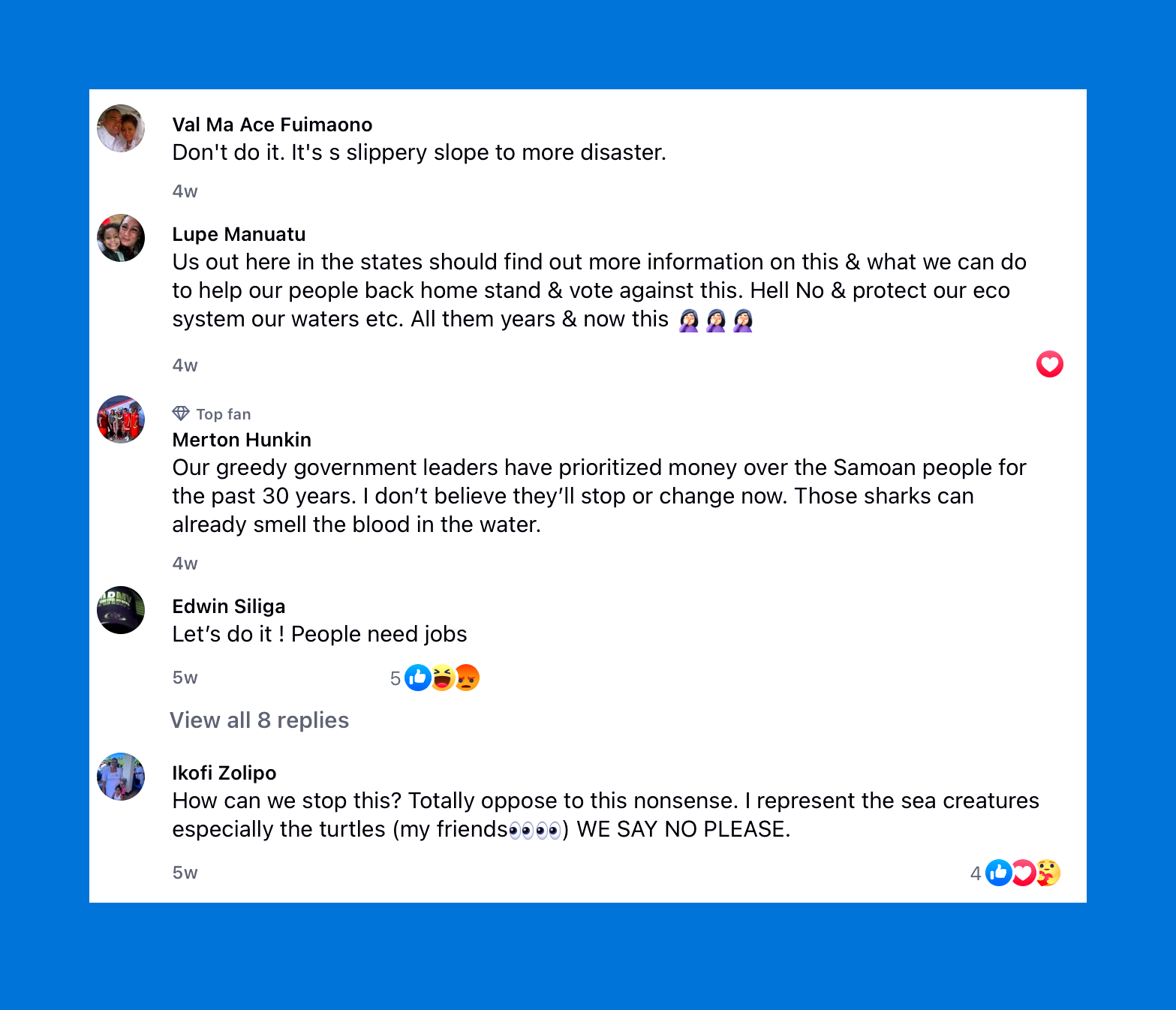
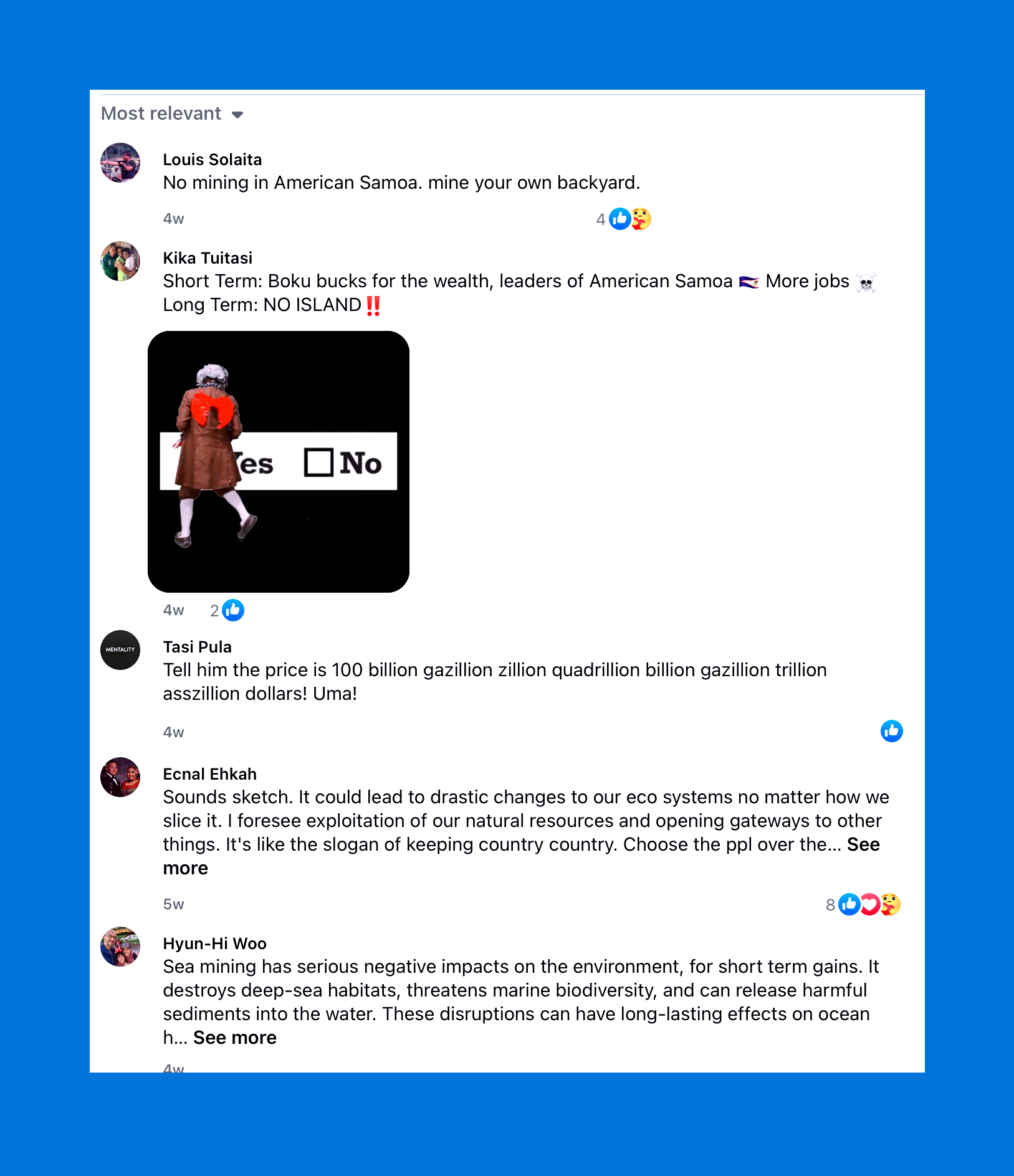
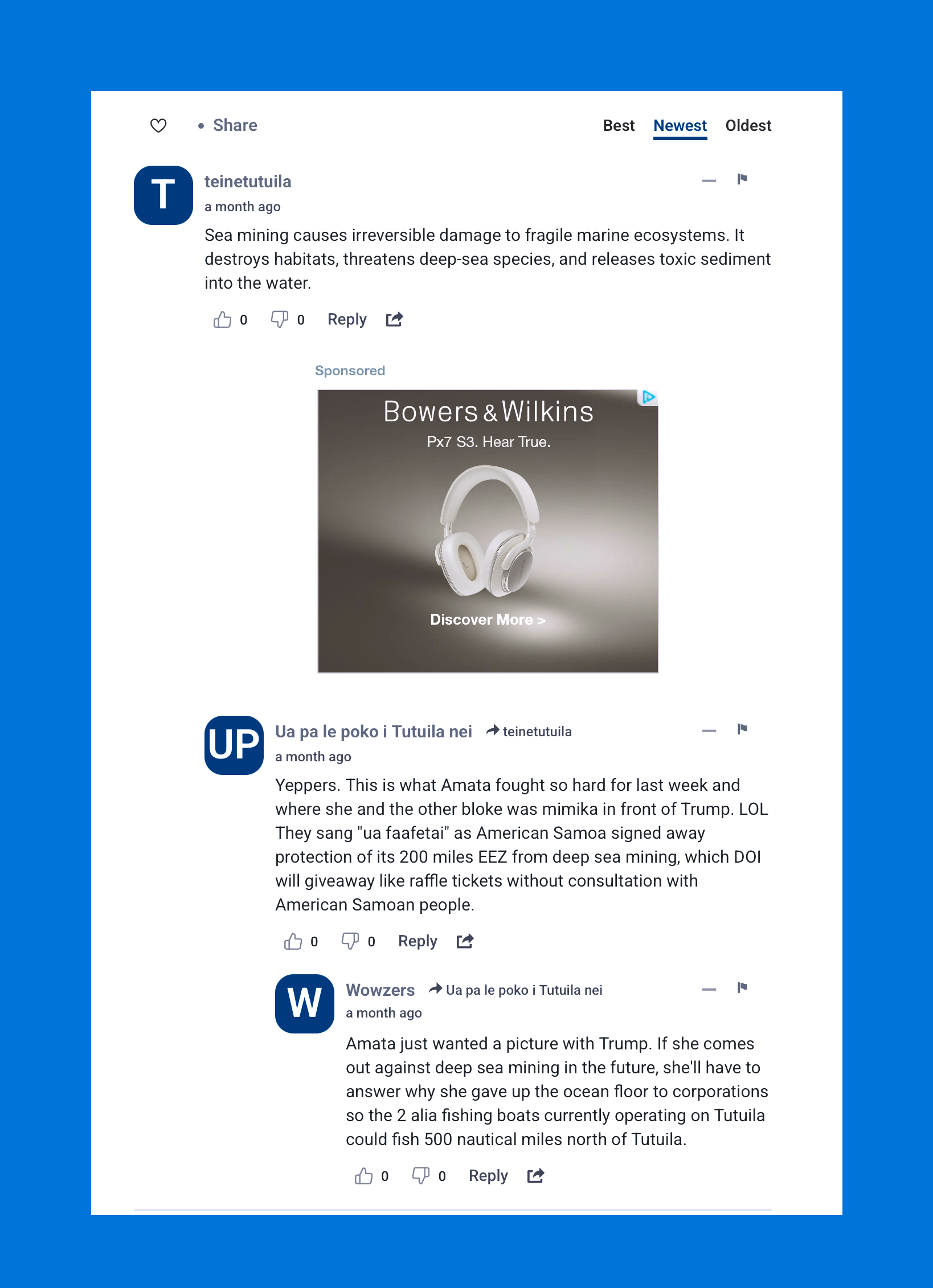
Other stakeholders
Environmentalists and scientists are among those to be consulted, but the community has been famously resistant.
The influential activist organisation, GreenPeace, called Impossible Metals desperate when news broke earlier this year that it was re-submitting the application:
Impossible Metals’ application for a deep-sea mining lease in U.S. federal waters is not a sign of industry momentum - it’s a glaring red flag of desperation. The move comes on the heels of a cascade of failures across the deep-sea mining sector that reveal the fundamental instability of the industry.
Cultural leaders in the Pacific are also outspoken. Solomon Kaho’Ohalahala, Hawaiian elder with the Maui Nui Makai Network has been unequivocal:
"The Pacific has spoken clearly: our ocean is not a sacrifice zone. American Samoa’s moratorium reflects a deep cultural, ecological, and economic understanding of what’s at stake. For Impossible Metals to pursue a mining license just beyond those protected waters is not only reckless—it’s a betrayal of the values and sovereignty of Pacific Peoples. We as people of the Pacific do not recognize lines in the ocean drawn by Western governments. The fish can’t see those lines, we don’t see those lines. All of the Pacific is sacred."
While Joey Tau of the Pacific Network on Globalisation said it is a matter of "the human rights of Pacific people and those that have very close connections with the oceans".
The American Samoa Economic Development Council
But a community non-profit concerned with Samoan economic development, The American Samoa Economic Development Council (ASEDC), doesn't take an absolutist stance.
The group, which formed in 2019 and became an observer at the International Seabed Authority last year, recognises the many challenges, but says it wants Samoans to benefit.
In its request for observer status at the International Seabed Authority , ASEDC wrote (generally):
We expect profit minded corporations to maximize returns within prescribed parameters. We are also wary of unscrupulous means to achieve those very same returns on investment.
(We) are in a unique position to advise and collaborate, be an informed advocate, and recommend equitable policy from what best may be called the potential for twenty-first century colonial opportunism.
The non-profit wants skills and jobs to stay local:
A major goal of ASEDC is to develop seabed nodule refining and battery research and development to students from Pacific nations. The Pacific experience has been that foreign experts have dominated high wage and high technical skill with little or no technology transfer to local students, interns and apprentices. ASDEC will reverse that ill conceived economic history.
Special technology
Impossible Metals will have to respond to these real concerns in formal consultations, whilst the US government would do well to consider a formal benefits sharing agreement for the Pacific territory.
But in environmental discussions, the company will no doubt trumpet its unique selling point - its technology.
The company says it has built robots which hover over the seabed in order to minimise disturbance. The robots are also said to pick up the nodules individually, and only in patterns that would not leave entire seabed areas stripped of the mineral deposits that have developed over millennia.
Impossible Metals has compared its robots to what it calls the 'dredging machines being used by other companies'.
Impossible Metals YouTube video showing its AI robot hovering and selectively picking up nodules versus the 'dredging method used by competitors'
The deep sea mining company says the robots will be ready by 2027 and that it's now in the testing and validation phase of ensuring they are robust and can withstand the harsh conditions of the deep.
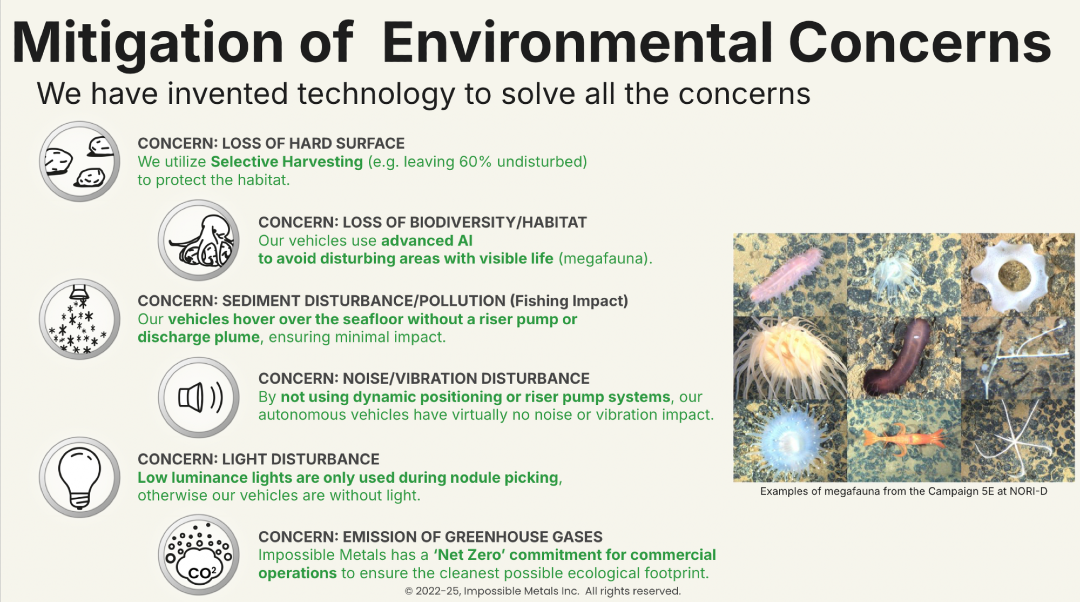
BOEM
BOEM conducts its own assessment of marine resources in US waters and has been compiling a minerals database, with location and quantities.
It says it carefully evaluated whether to move forward with Impossible Metals‘ application and emphasised that it was unsolicited, having been submitted 16 days prior to the Trump executive order which greenlit deep sea mining in both US waters and areas beyond national jurisdiction.
Impossible Metals is proposing to operate within the US Outer Continental Shelf, which was always within the purview of the United States to exploit and regulate.
It's why BOEM is handling the application and not the National Oceanic and Atmospheric Administration, NOAA. NOAA is the regulator for areas beyond national jurisdiction, and is therefore responsible for the other American deep sea mining hopeful, The Metals Company,
Like NOAA, BOEM says it will also ensure full compliance with relevant environmental legislation, namely the National Environmental Policy Act, the Endangered Species Act, and the National Historic Preservation Act.
But the Trump administration wants the metals surfaced sooner rather than later and whilst processes are underway, the Secretary of the Interior, Doug Burgum, set the tone:
"Critical minerals are fundamental to strengthening our nation's resilience and safeguarding our national interests. By providing opportunities to responsibly access deep-sea mineral resources, we are supporting both American economic growth and national security.”
Read:
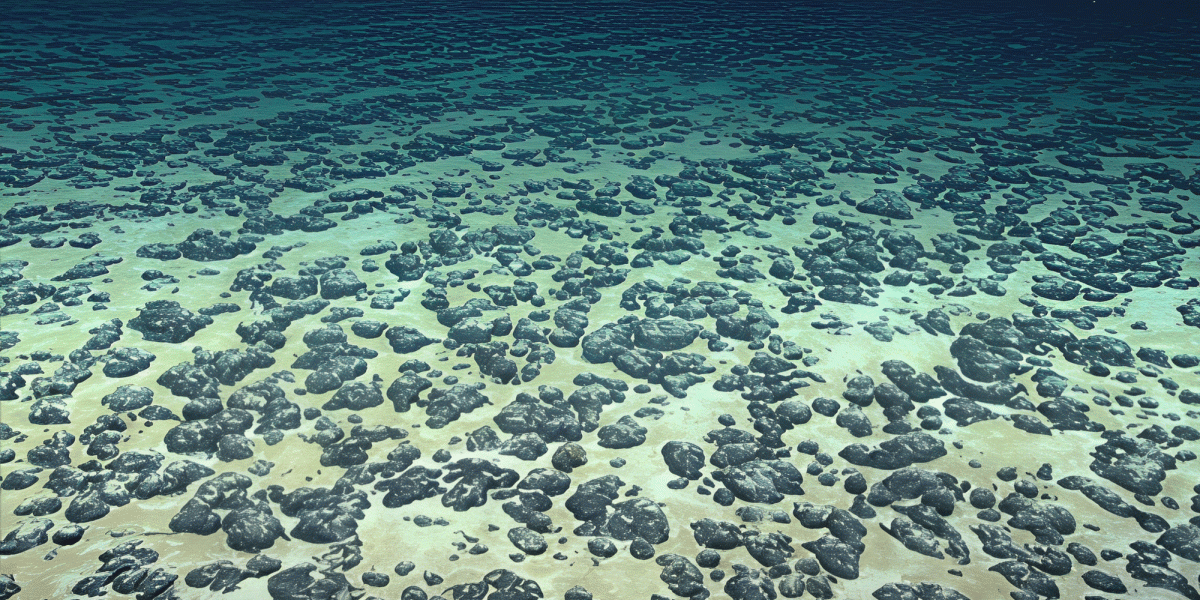
For editorial comments or questions: [email protected]


